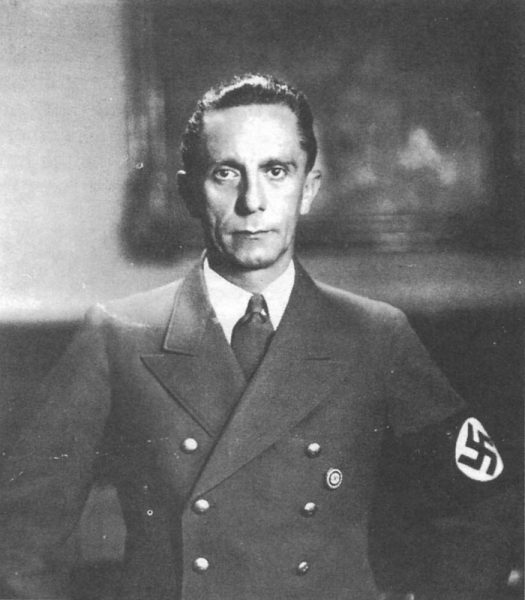
Brainless German Court Rules That Descendants of Nazis Can Make Money Off The Genocide Of 20 Million People
A brainless German court, probably run by a Nazi relative or Jew hater, has ruled that the descendants of Nazi criminals can make money off the heinous crimes of their ancestors.
The Third Reich’s minister of propaganda, Joseph Goebbels, wrote in personal diaries while committing his crimes against humanity, and a German court has now ruled that the family estate of Goebbels is entitled to royalty payments when someone quotes the Nazi horror diaries.
Here is America, we have laws against making money off crimes you commit, but Germany apparently does not.
This is part of the latest push to crank back up the Jew Hating Machine in areas around the world, including Germany.
You would think that Germany, of all places, would want to show that they are on the side of the Jews and not the Nazi animals, after their nation was at the heart of the worst genocide in world history – but no.
I wonder when the next Nazi party of criminals will spring up in Germany, and start killing groups of people they dislike? With shit like this going on in Germany, it can’t be far off..
Historians are reacting with outrage after a German court ruled that publishers must pay royalties when quoting from the diary of top Nazi leader Joseph Goebbels.
Goebbels served as the Third Reich’s minister of propaganda and was known for his fervent commitment to Nazi ideology. He publicly promoted attacks on German Jews and Christian churches, endorsed the Holocaust, and during World War 2 he encouraged Hitler to pursue a policy of total war. In May 1945, as Berlin was being overrun by the Soviet army, Goebbels poisoned his six children with cyanide and then committed suicide with his wife.
The lawsuit concerns Goebbels’ personal diaries, which cover the years 1924-1945 and provide an important inside view of the Nazi regime. The diaries, which were rediscovered in 1992 in a Russian archive after the fall of the USSR, are copyrighted, with the rights held by Goebbels’ estate. Who exactly is in that estate is unclear, but it is believed to consist of the descendants of Goebbels’ siblings.
A major 2010 biography of Goebbels written by history professor Peter Longerich quotes extensively from the diaries without paying any royalties to the Goebbels estate. That resulted in a lawsuit from Cordula Schacht, a lawyer who is herself a daughter of former Nazi minister of economics Hjalmar Schacht. Publisher Random House offered to make payments if they were given to a Holocaust-related charity, but Schacht insisted the money should go to the Goebbels estate. The publisher’s lawyer also argued in court that the copyright should be transferred to the German state of Bavaria, which holds the rights to Adolf Hitler’s Mein Kampf and refuses to demand royalties.
Academics have argued it is morally abhorrent to seek to profit off the words of somebody as odious as Goebbels.
“It’s quite shocking,” University of Southampton professor Neil Gregor told Times Higher Education, “that these diaries – the ownership of which has passed down through unrepentant far-right circles over the years, and now rests with the daughter of Hitler’s anti-Semitic economics minister Hjalmar Schacht – are being used, effectively, to profit so shamelessly from one of the chief culprits of Nazi genocide.”
A Munich court ruled that, legally speaking, it didn’t matter. The Goebbels family owns the rights to the diaries, and is therefore owed compensation when they are quoted.
The court’s ruling will only have small financial implications, as it also ruled royalties should cease at the end of 2015 due to it being 70 years since Goebbels’ death. But scholars warn that forcing historians to pay royalties for their historical research could stifle scholarship.
“I am worried about the precedent this sets for the many other diaries that scholars have used freely over the last 50 years,” David Cesarani of Royal Holloway, University of London told Times Higher Education. “We can only hope that the German supreme court will have second thoughts about allowing the descendants of Nazis to make money from the criminality of their forebears.”
In the United States, the doctrine of fair use generally allows academics to extensively quote copyrighted materials in their work, but this doctrine is not as strong in many other countries, including much of Europe.
Stand Up To Government Corruption and Hypocrisy – usbacklash.org
